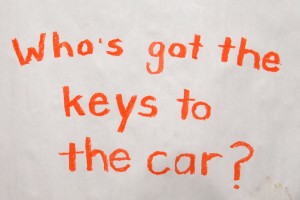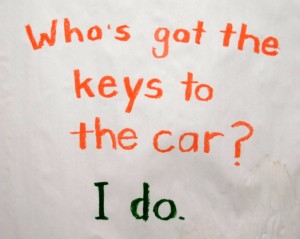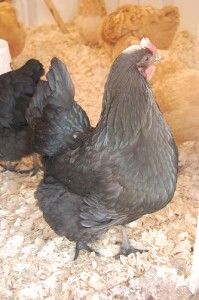Fear. Hope. Joy. Grief. Tears. Why, I asked myself, am I all a jumble?
Driving home from a doctor appointment I was flooded with emotions, and all I wanted to do was have a good cry. But why? Were they tears of fear? Of relief? Of joy? If fear, fear of what? Fear of no longer having any excuses?
For about ten years my speaking voice has been deteriorating.
For about ten years my speaking voice has been deteriorating. It began with just sounding strained, sometimes raspy or gravelly. It has progressed to the point where my voice breaks, stopping and starting, and it takes a great deal of effort at times to force words out.
When the troubles started, I had been working for several years as a recruiter and salesperson – interviewing candidates, meeting clients, negotiating placements, and making follow-up calls. In other words, I talked for a living. And I loved it. I had what was for me, at the time, the best job in the world.
I thought at first that maybe I had worn my voice out from talking too much. It didn’t hurt – it just didn’t work right.
It grew gradually worse, and I wondered about various possible causes. Was it stress? Was it that I lived for a year in a sick (moldy) house? Was it the result of 20 years of second-hand cigarette smoke? The symptoms didn’t go away as possible causes were eliminated, and various doctors couldn’t agree. I eventually resigned myself to living with it, although it was embarrassing: Customers would ask if I was feeling well, and family members would ask if I was upset about something.
Certain words were especially hard to say: Hello. Susan Blake. Salad. Oddly enough, though, I could still sing.
It continued to get worse. Sometimes it was fine, but it got increasingly harder to have conversations, especially on the phone. Certain words were especially hard to say: Hello. Susan Blake. Salad. Basically any word with an emphasis on a syllable with a vowel in it – which is most of them. The vowel just wouldn’t come out. And the harder I tried the worse it got.
Oddly enough, though, I could still sing.
I didn’t let it stop me. My job (a different one by then) was eliminated in 2009, and I jumped into working from home – which involved a lot of phone calls and meetings. Oh well. You do what you’ve gotta do, right?
Then something interesting happened. I was at a conference, chatting with several people, and one of them took me aside and said she had noticed my voice, and told me that she used to sound like me. She asked if I had been diagnosed, and I said No, I had been to several doctors but they hadn’t come up with anything. She nodded, and told me that she had been diagnosed with Spasmodic Dysphonia, a neurological disorder that causes the vocal cords to spasm. She was being treated with botox shots to the vocal cords. (Eeew!)
That was interesting, even exciting, but I did nothing – ignoring the situation and attempting to power through it.
Almost a year later, another woman took me aside and told me the same thing. She passed the names of some specialists along, but I still did nothing.
Even though I knew there was a good chance that I had a real physical condition, I didn’t pursue getting an official diagnosis. I gave myself a lot of reasons.
Even though I knew there was a good chance that I had a real physical condition, I didn’t pursue getting an official diagnosis. I gave myself a lot of reasons – I didn’t want botox shots in my vocal cords. I was afraid I would no longer be able to sing. I haven’t sung in a choir in years, but singing has always been an important part of my life. I told myself that getting diagnosed with something that might be considered a pre-existing condition while I am getting my health insurance through COBRA might make it difficult, or impossible, or at least ridiculously expensive, to get individual coverage later. I said it didn’t matter how my voice sounds, even though the work I am pursuing involves a lot of group facilitation and public speaking, since I am getting lots of unsolicited praise for my coaching and facilitation skills. Also, several people – including intuitive coaches – told me that when I found my “true voice” my vocal problems would clear up. Part of me believed that.
I heard a recording of myself participating in a webinar, and I HATED the way my voice sounded.
My symptoms continued to grow worse, and I got tired of getting on the phone with someone new and having them say, “I don’t think we have a good connection, you’re breaking up. Can I call you back?” “No,” I would say, “It’s just my goofy voice.” Then, one day not long ago, I heard a recording of myself participating in a webinar, and I HATED the way my voice sounded. More than the normal “Ugh, is that really how I sound?” that most people experience, it was horrible.
So when I met a voice coach through an online community of which I am member, and she sent me a coupon for a voice coaching session, I said, “Why not?” After all, I pay attention to coincidences. We scheduled the call, and I completed her questionnaire – including information about my voice and the two people who had suggested it might be Spasmodic Dysphonia.
She cancelled the appointment – rightly – because I had an Undiagnosed Medical Condition.
I was crushed. I completely understood – and yet, I was surprised by how disappointed I was. And I was surprised that I was surprised. But I had finally admitted how much my voice bothered me.
I shared all of this with my sister, who sent me a link to a recent NPR story about a woman who had lost her voice and was diagnosed with another form of dysphonia. She visited a specialist who diagnosed her and treated her with a special massage of her vocal cords and neck. I listened to the interview and the vocal exercises the doctor gave her, and when she spoke clearly for the first time I burst into tears.
Which surprised me.
And that surprised me. (Hmmm, see a pattern here?) I have hated the sound of my voice for a long time but I thought that nothing could be done, so I stuffed it. I was beginning to have hope that maybe something could be done – and I was terrified.
Hope can be a terrible thing.
Hope can be a terrible thing. Not in the sense that it keeps you from acting, waiting for a miracle (which it can, which is a terrible thing), but because it takes courage to hope and act on it in spite of your fears. And once you let the genie out of the bottle…
Well, the genie was definitely out of the bottle. After a few days of just being with that, I screwed up my courage and made an appointment with my doctor and asked her for a referral to an Ear, Nose and Throat specialist. She gave me one, with her blessing, and I made an appointment.
I was terrified all week before the appointment – terrified that he wouldn’t be able to help me and my hopes would be dashed, that the only option would be botox shots, that the botox would ruin my ability to sing. But I was committed to going. And I did something important: I talked about it. I told people about what I was doing, made myself and my fears visible, and I asked for support. (And I joked with colleagues that if the specialist couldn’t help me, perhaps I would become The Singing Facilitator.)
Then my cousin was diagnosed with a brain tumor. And it occurred to me that maybe my problem was pretty small in comparison.
It occurred to me that perhaps instead of hating my voice I might consider thinking of it with compassion.
And after a conversation with a Buddhist friend about the importance of compassion, especially for ourselves, it occurred to me that perhaps instead of hating my voice I might consider thinking of it with compassion. This wouldn’t change my plan, but it could change my attitude.
So I went to the specialist. I told him my story (the short version), and he said that just from listening to me he suspected that I did indeed have Spasmodic Dysphonia (SD). There is no cure for SD, but it is now recognized as a physical, neurological ailment that is not resolved through counseling or psychiatric methods. There is no cure, but the accepted treatment of the symptoms is botox shots to the vocal cords. (“Eeew,” I said.) Treatment at his clinic also includes working with a speech pathologist to unlearn various compensatory behaviors that people develop to try to force words out. (I get that – I had to unlearn protective and compensating habits years ago when recovering from shoulder surgery). He asked me to schedule a session with the speech pathologist for testing and an official diagnosis.
I told him that singing is very important to me, and asked if the botox injections would affect my ability to sing. He admitted that he did not know, and said he would email some other specialists and ask on my behalf. Cool. I also asked if anyone was doing anything with acupuncture, and again he did not know. (A doctor who will admit he does not know something gets a lot of points as far as I’m concerned.)
What is this about? Fear? Joy? Relief? Grief?
But all the way home, I just wanted to pull over and have a good cry. Why was I all in a jumble? I asked myself, “What is this about?” Fear? Fear of what? Fear of the treatment? Fear of it not working? Fear of losing the ability to sing, which comes from my soul? Fear of no longer having a reason to hate myself (my voice)? Fear of no longer having excuses to pursue my goals of public speaking, facilitating and coaching? Fear of giving up certain beliefs, even if they were bullshit? Were they tears of joy? Of relief? Of grief? Or all of the above?
Driving home I was listening to the soundtrack from The Beatles LOVE, which is a brilliant re-work of Beatles songs and snippets that blend in and out of each other in an amazing jumble, and it was so appropriate. Chaos in the music, chaos in my head – but not quite, because it all fit together. More like the edge of chaos, about which I’ve written just recently. You have to be willing to be at the edge of chaos for something new to happen. I was definitely at the edge of chaos – at the very least.
You have to be willing to be at the edge of chaos for something new to happen.
I didn’t let myself have that good cry until the next night, and what a Wail Fest it was. Why? Grief. And Relief. And Hope and Fear and Joy. There was a lot of letting go to do. Letting go of the denial: I have something for which there currently is no cure. Even with the botox, my voice will never be the same. Letting go of the idea that there was someone to blame – that it was all the result of my late husband’s smoking, or that it was my fault – the result of stress (stress of being a caregiver, stress of my husband’s death, job stress, loss-of-job stress) – or that it was the result of confidence issues, or of stuffing my wishes and my voice in favor of others and that I just hadn’t done enough work on myself – when, in fact, I have made choices consciously and without regret, and I am in a very good place. My voice isn’t broken because I’m maladjusted. There is no one to blame.
There is no one to blame… but I have let this be an excuse.
But I have let this be an excuse. I had to admit maybe I haven’t finished transcribing the 47 interviews I did for a very cool research project last year, not because I’m So Busy starting my own business, but because I so hated listening to my own voice. I had to admit that I have hesitated to take steps to launch my own workshops and record webinar products because of my voice. I was embarrassed at myself, and I grieved for the lost time.
And in the midst of all those tears, I found compassion. Compassion for myself. Compassion for my voice. I didn’t break my voice. And it helped to think that my voice certainly didn’t want to be broken, and it wasn’t trying to send me a message. My speaking voice is just broken.
I also remembered something I had learned years ago: I didn’t Cause it, I can’t Cure it, and I can’t Control it. But I can Contribute to making it worse – and hopefully to making it better.
Before I went for the testing with the speech pathologist, I did some research, and I wrote to the clinic featured in the NPR story. Various members of my family have sent me links to research on acupuncture as a treatment for SD. I spoke with a friend who is a professional singer and voice coach, and it turns out that she has worked with several people with varying degrees of SD. She helps them first to strengthen their singing voices and place them in “the mask” rather than sing from their throat – I totally get that, having studied voice for three years in college – and then she helps them learn to speak through that place as well. Hmmm.
She had me sing Happy Birthday. Even singing with a tube down my nose she said I gave her goose bumps.
I met with the speech pathologist, and she agreed that I have all the hallmarks of SD, with no nodules or irritation on the vocal cords, and no dire diseases. She recorded me reading some scripted material, and then she did various tests involving scopes down my throat and up my nose. I had also explained to her about the importance of being able to sing, and she had me sing Happy Birthday. Even singing with a tube down my nose she said I gave her goose bumps.
It was very interesting seeing how the vocal cords spasm when I talk but not when I sing. It turns out that speech is controlled by a different part of the brain than singing, which is why it is not unusual for people with SD (and people who stutter) to still be able to sing.
She was all in favor of the botox shots, but she also understood my hesitance. She offered to round up some patients for me to talk to, and she also suggested I do some searches on YouTube because there are a lot of videos there of people with SD and there might be some before/after videos. I have homework.
I also asked her about the work she does to help people unlearn bad speech habits they’ve acquired. She explained that she helps them learn to place their voices differently, usually in conjunction with the botox treatments. She has also done some work with singers who have damaged their vocal cords through how they speak, training them to speak more like how they sing. Bingo. The work she described is somewhat similar to what my friend does (and is covered by insurance) so I asked if we could just start with that – knowing that statistically voice therapy alone isn’t as useful as the combination – and she said yes. So I have an appointment for my first voice therapy session with her. Since I have had some voice training in the past, maybe I will have an advantage.
When I shared all of this with my family, one of my brothers, who is a musician and has also studied voice, wrote: “My singing instructor used to say, Good speech is half sung.” Hmmm.
Lessons… Why do there always have to be lessons?
I have learned a lot of painful lessons through this process – many of which I thought I already knew:
- Denial is a powerful thing.
- Sometimes our reasons (excuses) for doing something – or not – are not what we thought.
- It’s all too easy to believe something is my fault – even though I have no sound and current data to support that.
- More than one thing can be true at once.
- I have to be willing to be at the edge of chaos for something new to happen.
- I didn’t Cause it, I can’t Cure it, and I can’t Control it. But I can Contribute to making it worse – and hopefully to making it better.
- Talking about my fears makes them look smaller, and sunshine is the best disinfectant.
- Caring is dangerous. Live dangerously.
Caring is dangerous. Live dangerously.
I make my living partly with my voice, but I sing for joy. I’m not ready to trade the joy in on the living yet. But I am going to do everything I can to improve my speaking voice – I have gifts to share and I cannot let this stop me. It’s scary; I don’t know what will happen. But there is no spoon. I can’t control this disease, yet there are things I can do. Maybe I will learn how to speak like a soprano. (Not to be confused with The Sopranos.) If I can focus on joy and the Wonder that is my purpose and bring them to re-learning to speak, maybe I can beat the statistics. I may end up getting the botox shots, or maybe I will become The Singing Facilitator.
I have dreams, and I can make them come true. The process has begun. No excuses, only choices.
I may have to put my money where my mouth is and find a choir to join.
 Last year, in the Spring, I was preparing to lead a workshop. It was new. It was big. It was exciting.
Last year, in the Spring, I was preparing to lead a workshop. It was new. It was big. It was exciting.





 Twitter
Twitter LinkedIn
LinkedIn Facebook
Facebook